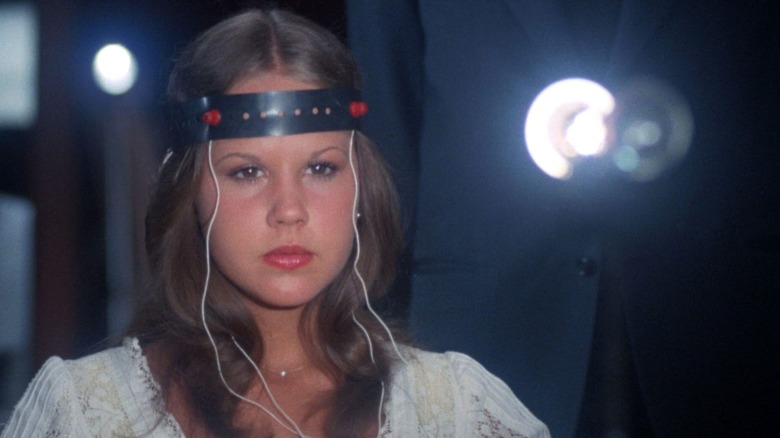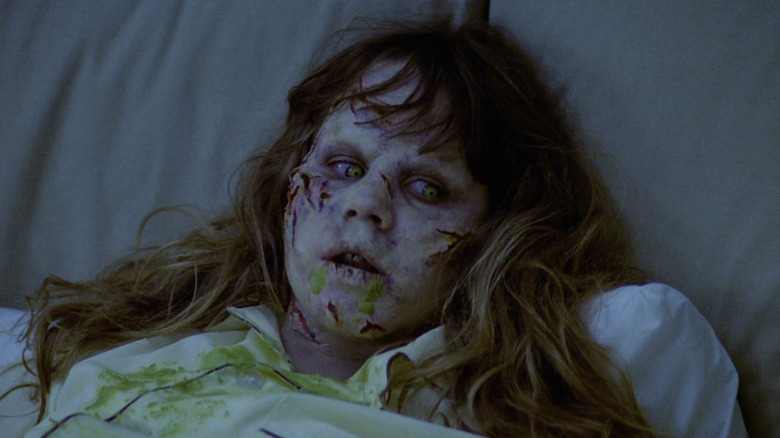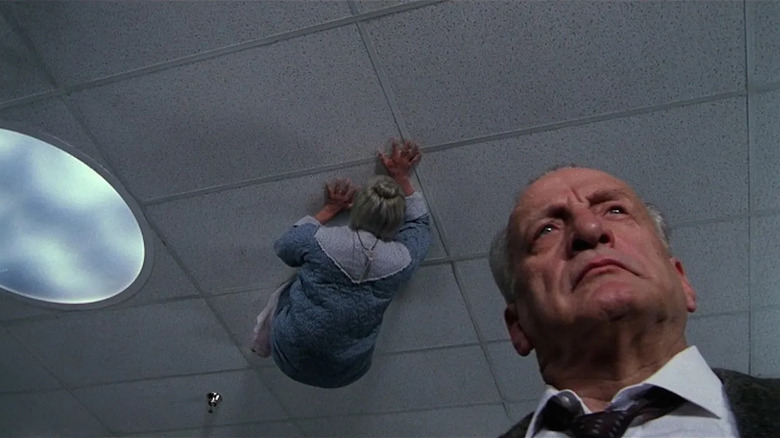Blumhouse's Future Is Riding On The Exorcist, Jason Blum's 'Riskiest' Movie Yet
It has long been the strict modus operandi of Blumhouse — the celebrated horror studio behind low-budget hits like "Insidious," "The Purge," "Paranormal Activity," and "The Black Phone" — to keep their film budgets in the $3 million to $5 million range. At a 2015 producer's panel, studio founder Jason Blum explained that those figures reflect what the studio could recoup, should a film fail to get a wide release. If the film isn't picked up, he explained, the studio at least doesn't lose much. If it is, the studio will continue to be in the black.
In recent years, Blum's budgets have increased slightly. The 2020 film "Freaky" ran a price tag of $6 million, and "The Invisible Man" was $7 million. Other, more recognizable releases like "Halloween Kills," "The Black Phone," and "The Forever Purge" cost about $18 million each. As modern blockbusters go, however, these numbers are still far below the average studio film.
Coming on October 13 will be a Blumhouse-backed reboot of William Friedkin's 1973 hit "The Exorcist," based on the novel by William Peter Blatty. This new Exorcist movie will be helmed by David Gordon Green, who helmed the studio's recent Halloween trilogy reboot, and is also the intended first installment in a three-film series. While its budget has not been made public knowledge, it will likely be the most expensive film Blumhouse has ever made. This, Blum feels, is a massive risk.
In a recent episode of IndieWire's Screen Talk podcast, Blum reiterated his philosophy of budgeting, declaring that the best way to make movies was to pair low budgets with high concepts. But because "The Exorcist" is such a well-worn and well-known property, it may be worth a larger budget, even if the risk is no one getting paid.
Growing the company
Blum pointed out that theatrical hits are the only way a studio like Blumhouse can make any considerable scratch, and that it's worked well for a while, but also that he would like to see some more growth. As it stands, a low-budget hit actually requires a great deal of planning, leading to only so many movies per year. To make more, it seems a merger might be required first. Hence why Blumhouse has paired off with several major studios in recent years (several of their films have been distributed by Universal, for instance). Blum said:
"On the movie side of the company, we only get compensated if the movies we make are hits, theatrical hits. It's a very, very specific measure, but if the movies don't work we don't make any money. And the movies take an enormous amount of time and care and thought to get right. We don't always make hits, but we make them more often than not. And it's very, very hard and labor-intensive to do that. I'm interested in growing the company [...] so I've really thought a lot about how can I get from four-to-five to six-to-seven studio theatrical hits, and the only way to do that is to take on a partner."
As one can see, Blum tends to think of movies with a savvy business eye. One might compare him to Roger Corman, the legendary B filmmaker, who claims to have never lost money on a movie. As such, Blum talked a lot on the podcast about the lengths of TV licenses in the streaming era, and the way rights can be split. All of this eventually led him to the logic behind a larger-budget project like "The Exorcist." In a streaming marketplace, it now made sense.
The business side of things
Blum explained that modern streamers, pretty much across the board, are happy to overpay actors and directors, but are notoriously stingy when it comes to striking deals with fellow producers. He explained that with "The Exorcist," he engaged in a complex process called a reverse buyback, which got Blumhouse a huge amount of money. And while one might assume that a bigger budget would allow for larger, wilder ideas, instead it had to go to something that was familiar; Green's "Exorcist" movie will be the sixth feature film based on William Peter Blatty's novel, and that's in addition to a 2016 TV series, as well as hundreds upon hundreds of knockoffs.
Blum explained that there are two tracks at Blumhouse: the original films track, and the sequel track, and that they play by different rules in both budgeting and creatively. He said: "When you have a sequel or an existing I.P., your marketing is built in. We spend much more money on our sequels." This makes sense, as an audience will recognize a title right away; less explanation is needed. An original film, he said, was "a ton of risk." "The Exorcist," however, was different, even though it was on the sequel track. Blum said:
"The riskiest movie I have ever made, for sure — it's not out yet — is 'The Exorcist.' [...] Just because it's so expensive. [...] Usually the bar for success on everything we do, just because they're so inexpensive, is incredibly low."
Ultimately, though, Blum feels that the future of cinema is going to be with original stories. "The audience is starved for it," he said, feeling that too many studios and streamers rely on data for their decisions. The storytellers, Blum feels, will win out in the end.
"The Exorcist" is set for a theatrical release on October 13, 2023.


